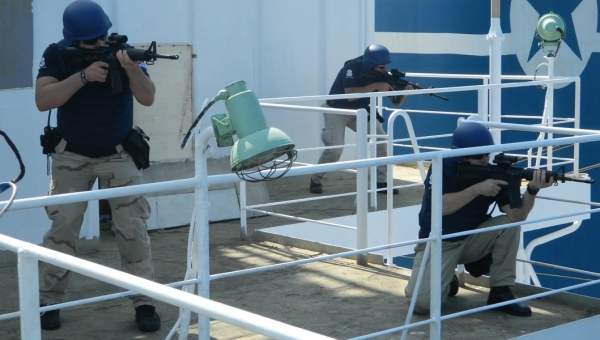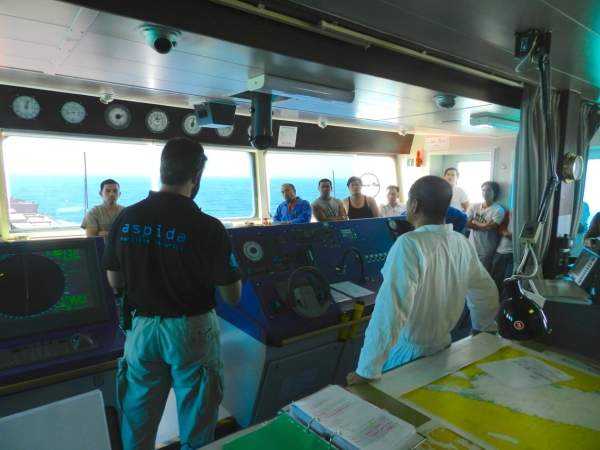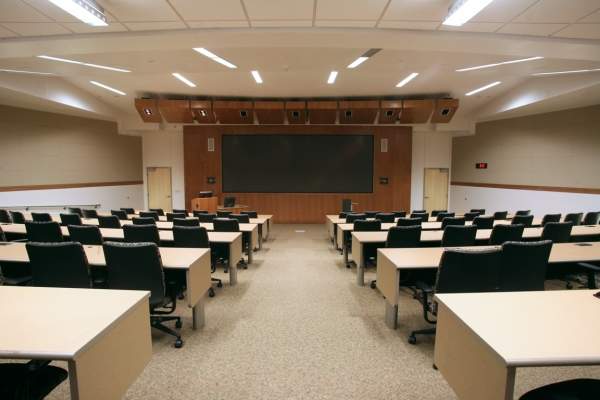Aspida is an experienced private maritime security company (PMSC) offering a comprehensive range of risk mitigation solutions specifically focused on the maritime sector, fulfilling all IMO guidelines for the use of armed security guards onboard merchant vessels.
Aspida is a founding member of the International Code of Conduct Association for Private Security Companies and one of the first companies to be accepted to the Security Association for the Maritime Industry (SAMI). Aspida is now a certified stage one SAMI member, and is currently undergoing ISO 28007 certification. Aspida’s Easi-Chock© door securing device was born out of first-hand knowledge of the intricate needs of the maritime security industry.
Piracy in West Africa
While the international maritime community focused on Somali piracy in recent years, by 2011, piracy in the Gulf of Guinea had become an issue of global concern.
Piracy in the Gulf of Guinea has evolved over the first decade of the century. Smaller ships shuttling employees and materials belonging to oil companies are increasingly at risk in Nigeria. Over time, pirates are becoming more aggressive and better armed.
Gulf of Guinea piracy affects a number of countries in West Africa, as well as the international community. Pirates in the Gulf of Guinea are often part of heavily-armed criminal enterprises, who employ violent methods to steal cargo.
Attacks in the Gulf of Guinea
While piracy in the Indian Ocean seems to be dropping, the situation in the Gulf of Guinea is alarming. The modus operandi of attackers in the Gulf of Guinea is quite different to that of the Somalis.
One of the major differences is the level of violence. As recent battles with the Nigerian Navy attest, the local criminals are not easily dissuaded. Such is the level of concern that at the end of August the Nigerian Air Force (NAF) announced its intention to deploy aircraft with strike capacity against the pirates.
Earlier that month, the Nigerian Navy killed six pirates in a clash with a local criminal gang, just a week after the deaths of a further 12 armed thieves in a separate incident.
It is a complicated part of the world in which to work and requires the development of an excellent relationship with the local police, security and armed forces.
Maritime security against piracy
In the Gulf of Guinea, experienced British team leaders, intelligence and proper training enhance the effectiveness of locally sourced armed personnel.
Another important issue is the relationship of the security team with the seafarers onboard the vessels. Coming from different backgrounds, both worlds must meet somewhere in between. Employing security personnel who are ex-military officers, rather than soldiers, provides a significant advantage. After all, the core business of PMSC relies on offering peace of mind to the crew, as well as the shipping company.
Good communication between the security team and crew is the cornerstone of correct deployment onboard a vessel. Aspida’s mixed nationality groups increase the chances of finding a common language.
Anti-piracy ship modification
As far as piracy is concerned, one of the most important aspects is to teach the crew how to deal with suspicious activity, attacks and emergency situations. They have to be vigilant.
The security teams must not let the crew even touch a firearm, let alone take a photo with one. Meanwhile, the role of intelligence is vital both in East and West Africa.
Aspida provides total security solutions, including security consultancy in new builds, as well as existing vessels. Experts can assist at the vessel’s design stage or advise the operator to retrofit solutions, increasing the security of the vessel. And, of course, Aspida can prepare SSPs to run classes, provide risk assessments and more.
Anti-piracy training
A core quality factor for Aspida is anti-piracy training, both for onboard and ashore personnel. Specialists design tailor-made courses, as well as the large number already running.
UN Secretary General Ban Ki Moon warned in November 2012 that despite the sharp decline in attacks, progress was fragile and "easily reversed if we do not address the causes of piracy." Pirates are still out there. Vigilance, reporting, implementation of BMP4 and the use of a high-quality PMSC will keep the pirates at bay.
Personnel checks
For the second consecutive year, Aspida continues its collaboration with Alere Toxicology, proving the company’s commitment to providing personnel of the highest standard. Alere Toxicology is a world-leading provider of drug and alcohol testing services and products, performing more than ten million laboratory tests each year for customers across all industries.
PCASPs employed by Aspida are carefully recruited, trained, certified and approved with a range of documentation and checks before deployment including CRB, army discharge papers, seamans book, STCW, all MSO, FPOSI, MFCC, psychometric evaluation prior to interview, drug and alcohol, cardio, seafarers medical and psychiatric clearance. On-site tests before embarkation are also available, when required by customers.






